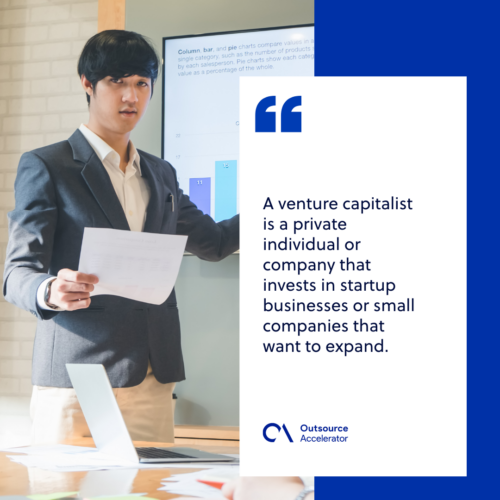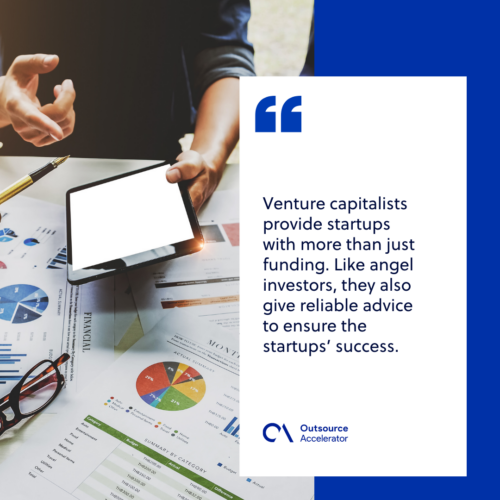Venture capitalist
Definition
What is a venture capitalist?
A venture capitalist is a private individual or company that invests in startup businesses or small companies that want to expand.
Venture capital companies often operate as limited partnerships, with the partners investing the funds that the firm would use. These partners may be wealthy individuals or representatives of foundations, corporate pension funds, insurance companies, etc.
These firms usually have a committee responsible for making investment decisions. While all the partners share the funds’ ownership, the decision of where to invest rests solely with the firm.

Venture capitalist vs. angel investor
In contrast with angel investors who fund startups using money from their own pockets, venture capitalists derive their funding from the venture capital firm’s resources.
Venture capitalists also show up later than angel investors. Whereas angels generally invest in the early stages of startups (sometimes even during the conception stage), venture capitalists target businesses in the commercial phase.
Another difference between the two is in the equity percentage that they demand. Angel investors rarely take more than 25% of a company’s share of stakes, while venture capital firms want a large portion of shares to influence the company’s direction.
Venture capital firms invest in startups that show potential but are too risky for banks and capital markets.
As venture capital investments are generally high-risk-high-reward investments, venture capital firms search for businesses or companies that show tremendous growth potential, marketability, and a unique product or service.
How do venture capitalists work?
Similar to angel investors, venture capitalists offer a form of equity financing to startup businesses or companies. Venture capitalists provide the startups’ needed capital in exchange for the ownership of a percentage of their equities.
Startups usually turn to venture capitalists when their businesses are too high-risk for banks and other capital lenders, and their angel investment funds threaten to run out.
After finding a venture capital company, the startup would make its pitch to the firm. It may present a business plan elaborating the company’s planned course of action and growth projection over time.
If the firm is interested in the startup’s plans, it will invest in the company, and the seeding round can proceed. Companies typically receive three to four seed capitals before they go public or are acquired.
In exchange for providing funding to startup companies, venture capital firms are given equities and some measure of influence over the companies’ decision-making.
The company may give the venture capitalists a seat on the board of directors, as well as the power to approve the hiring in certain positions or approve or disapprove further loans.
Venture capitalists provide startups with more than just funding. Like angel investors, they also give reliable advice to ensure the startups’ success. They may also help the startup by connecting them with the firms’ industry contacts.

How much equity do venture capitalists take?
Venture capitalists determine how many shares they would take in return for their investment by choosing a valuation for the startup company.
- Pre-money valuation – the venture capitalist and the startup company agree on how much the startup is worth.
- Post-money valuation – the firm invests money in the startup, increasing in value. The value increase determines how much equity the venture capitalist firm will receive.
The firm usually receives between 10% to 50% of a company’s equity.
Valuation dilutes the ownership of the company’s original shareholders. For example, if a venture capitalist firm gets 40% of a company’s equities, the original shareholders’ equities would be reduced to only 60%.
How to get funding from venture capitalists
Venture capitalists are highly selective in choosing where to invest.
Companies wanting to get on the radar of venture capitalist firms must at least be past the startup stage. Having a demonstrable service or product that they can market to the firms may also boost the chances of getting noticed.
Being associated with known industry names and bagging industry awards are also ways of catching these investors’ attention.







 Independent
Independent




